|
Antigone
In 1953, after her husband's death, Mechthild Harkness
created Sophocles' Antigone as a solo performance with
which she toured America and Europe. After coming to Australia in
1969 she revived her production, playing at the Q Theatre and other
venues in and around Sydney. The images on this page cover a range
of productions. 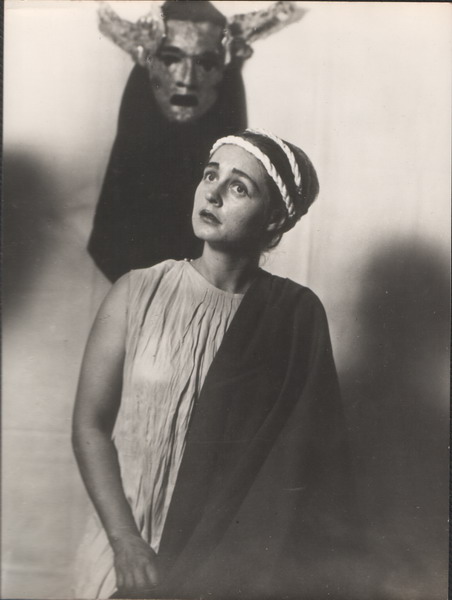 '....exquisite, fascinating
sensibility. The spectators were deeply and utterly moved.'
National Zeitung, Switzerland
.
'....exquisite, fascinating
sensibility. The spectators were deeply and utterly moved.'
National Zeitung, Switzerland
.
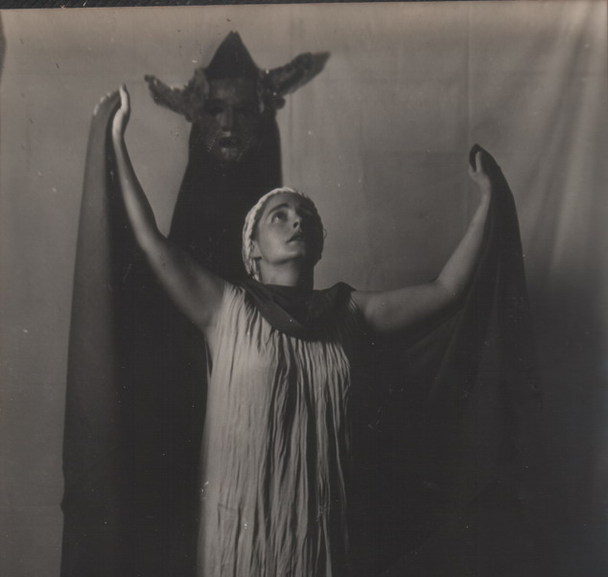 'Mechthild Harkness has not only fine artistry,
but a compelling presence that gives authority and meaning to
her characterization.'
Santa Barbara News Press, USA
'Mechthild Harkness has not only fine artistry,
but a compelling presence that gives authority and meaning to
her characterization.'
Santa Barbara News Press, USA
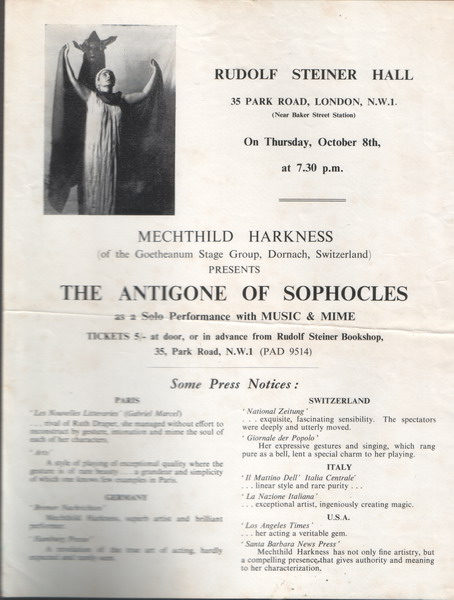 Paris
Les Nouvelles Litteraries (Gabriel Marcel)
.... rival of Ruth Draper, she managed without effort
to reconstruct by gesture, intonation and mime the soul of each
of her characters.
Arts
A style of playing of exceptional quality where the
gesture is of rare beauty .... a grandeur and simplicity of
which one knows few examples in Paris.
Paris
Les Nouvelles Litteraries (Gabriel Marcel)
.... rival of Ruth Draper, she managed without effort
to reconstruct by gesture, intonation and mime the soul of each
of her characters.
Arts
A style of playing of exceptional quality where the
gesture is of rare beauty .... a grandeur and simplicity of
which one knows few examples in Paris.
***
JOHANNSEN IMPRESSES WITH GREEK TRAGEDY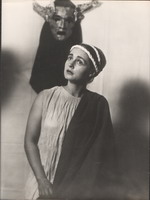
Tom Proctor
Ojai Valley News
Sophocles' tragic drama, Antigone, was given an
unusual and effective presentation by Mechthild Johannsen last
weekend at the High Valley Theatre. In an ambitious one-man show
Miss Johannsen depicted characters, chorus and played her own
compositions of incidental music.
The production is well conceived, and as an actress
Miss Johannsen shows admirable facility as she moves swiftly
from one sharply delineated character to the next, achieving her
effects through her flexible vocal ability and remarkable grace
of costume and body movement. The poignant scenes between
Antigone and her sister, Ismene, were particularly good, as was
the characterization of the old king, Creon.
Music as mentioned above, was created by the
performer, and proved once again that she is a woman of many
talents. Sounds of the harp and varying sizes of recorders were
contrasted with the brazen notes of a gong and drum beats in
beautiful melodic patterns, or
formal dark and foreboding accompaniments for the
tragic words of the classic.
As a tour-de-force, Miss Johannsen has chosen a
vehicle and a medium for which she is admirably suited. The
production is an excellent one. 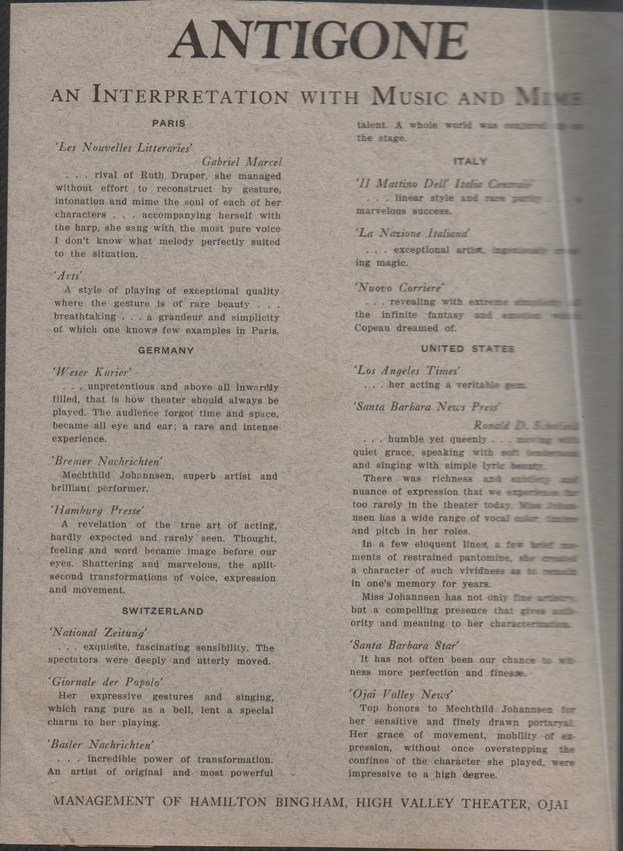
***
 La Jolla Light
La Jolla Light
Thursday, Jan 15th, 1953
Antigone Presentation Enjoyed
Here
A very enthusiastic audience attended the unusual
presentation of Antigone at La Jolla Art Centre last
Friday evening. Mechthild Johannsen, by use of her remarkable
voice color and range, her adequate but never superfluous
gesture and the mere shifting of a scarf portrayed all the
characters in the Dudley Fitts and George Fitzgerald
translations of Sophocles' great drama. She gave each one
his peculiar setting: played on reed instruments for intervals:
emphasized descriptions by playing on a small Irish harp and
strengthened dramatic effects by beating a drum or cymbal. Her
range of characterisation made possible even physical
differences for in directly dialogue the transformation from the
distraught young girl Anigone to the robust and cruel Creon was
readily visualized and accepted. Spectators, as tragedy followed
tragedy, waited with fascination the inevitable climax and the
just punishment of the man who abused his powers and nursed an
arrogant pride...... The Greek story, the originality of its
presentation, and Miss Johannsen's superb performance gave
members of the Art Center a memorable evening. (Freda L. Klapp)
***
Introduction to the dramatic presentation of
Antigone by Sophocles
...from programme notes
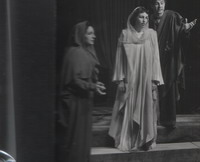 The tragic events centered around Oedipus, King of
Thebes, culminate in the third drama of Sophocles' trilogy
in the doomridden figure of Antigone, daughter of Oedipus. The
story begins with Oedipus, left in the wilderness at birth by
his royal father, King Laios of Thebes, in the attempt to
prevent a prophecy from being fulfilled.
Found, rescued and brought up in a foreign court,
Oedipus returns to his native city, unknowing of his
true origin. On the journey he kills his father and
after solving the riddle of the Sphinx that holds thrall over
Thebes, he is proclaimed King and given the widowed queen,
Iocaste - his mother - for his wife. Four children spring from
this marriage: two sons, Eteocles and Polyneices and two
daughters, Antigone and Ismene.
When the truth becomes known Iocaste hangs herself
and Oedipus puts out his own eyes. He is later deposed from the
throne by his sons and goes begging on the roads with Antigone,
to his death in exile.
The two sons agree to share in the rule of Thebes,
each to reign in alternate years. But their father's curse,
which they incurred when deposing him, determines their fate.
When Eteocles has ruled a full year he refuses to relinquish the
throne to his brother. Polyneices then calls upon the Argives to
support his cause and sets forth to besiege his native city with
the Argive army. When neither side seems to be winning the two
brothers agree to fight it out single handed. In the ensuing
combat they kill each other and the Argive host withdraws from
the siege.
Creon, uncle of Oedipus' children, now becomes
king. The scene is still Thebes, the public square before the
palace. The ensuing action is divided into three parts and takes
place between dawn and dusk on the day after the fatal battle
between the two brothers.
The tragic events centered around Oedipus, King of
Thebes, culminate in the third drama of Sophocles' trilogy
in the doomridden figure of Antigone, daughter of Oedipus. The
story begins with Oedipus, left in the wilderness at birth by
his royal father, King Laios of Thebes, in the attempt to
prevent a prophecy from being fulfilled.
Found, rescued and brought up in a foreign court,
Oedipus returns to his native city, unknowing of his
true origin. On the journey he kills his father and
after solving the riddle of the Sphinx that holds thrall over
Thebes, he is proclaimed King and given the widowed queen,
Iocaste - his mother - for his wife. Four children spring from
this marriage: two sons, Eteocles and Polyneices and two
daughters, Antigone and Ismene.
When the truth becomes known Iocaste hangs herself
and Oedipus puts out his own eyes. He is later deposed from the
throne by his sons and goes begging on the roads with Antigone,
to his death in exile.
The two sons agree to share in the rule of Thebes,
each to reign in alternate years. But their father's curse,
which they incurred when deposing him, determines their fate.
When Eteocles has ruled a full year he refuses to relinquish the
throne to his brother. Polyneices then calls upon the Argives to
support his cause and sets forth to besiege his native city with
the Argive army. When neither side seems to be winning the two
brothers agree to fight it out single handed. In the ensuing
combat they kill each other and the Argive host withdraws from
the siege.
Creon, uncle of Oedipus' children, now becomes
king. The scene is still Thebes, the public square before the
palace. The ensuing action is divided into three parts and takes
place between dawn and dusk on the day after the fatal battle
between the two brothers.
***
Audiences Spellbound by Antigone
Monterey Peninsula Herald, September, 1953
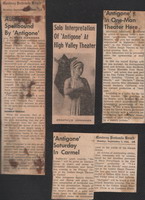
A Saturday
night audience which filled every seat in the Golden Bough
Players' Circle sat spellbound as Mechthild Johannsen gave
an inspired interpretation of one of the world's great
classical tragedies. In her solo performance of Sophocles'
Antigone, Miss Johannsen admirably recreated a
diversified cast of characters and managed to preserve all the
dignity and majesty of a full production. The text used by Miss
Johannsen is a Dudley Fitts and George Fitzgerald translation,
its five scenes woven into an impressive tapestry by music of
her own and Leopold van der Pals composition - performed with
skill and infinite grace on harp, flute, gong and kettle-drum.
Antigone, the third in a cycle of ancient
Greek tragedies beginning with Oedipus Rex, dramatizes
the conflict between an edict by the gods and an ultimatum of a
tyrant. While the situation, that of a young girl caught between
a law of the gods demanding that she perform funeral rites for
her slain brother and the threat of death at the hands of her
kingly uncle is she does so, seems long outmoded, the underlying
theme of the play and the lines through which it unfolds are as
timely as today's newspaper.
Miss Johannsen is not only an experienced actress,
but one exceptionally well equipped with beauty of voice and
feature. Her interpretation of Antigone showed a rare depth of
understanding and sensitive appreciation of her material. It
seems a great pity that this one woman show of Antigone
should be given only a single performance here. (Irene
Alexander)
***
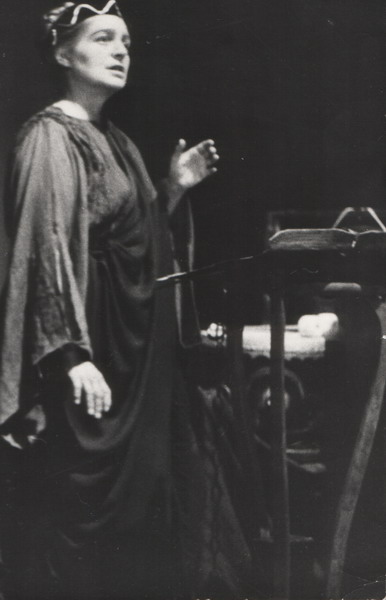 SYDNEYPRODUCTIONS
SYDNEYPRODUCTIONS
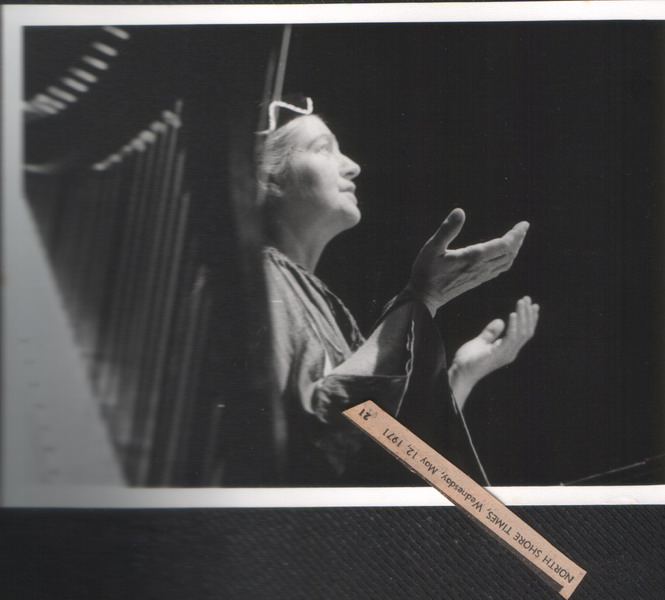 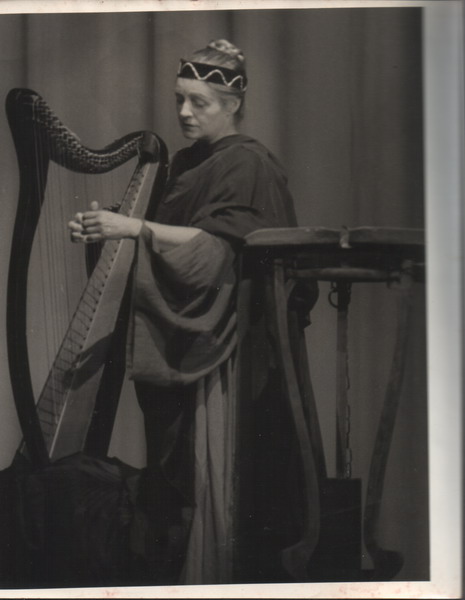 Curtain
Up
Solo performance by Mechthild Harkness of
Sophocles' Antigone at the Boama art centre,
Chatswood.
Mrs. Harkness has toured America, England and
Switzerland with this performance, which shows the depth of her
talent.
The tragedy of Sophocles' work was fully explored
by Mechthild Harkness' interpretation of each of the main
characters. She in turn was Antigone, her sister Ismene, King
Creon, his son Haimon, the blind prophet Teiresias, the sentry,
the messenger and the chorus.
The performance was a masterpiece of understatement
with a bare setting, a single costume with versatile drapes and
three musical instruments - a drum, cymbals and a harp, on which
the actress played to heighten the effect of the chorus. Curtain
Up
Solo performance by Mechthild Harkness of
Sophocles' Antigone at the Boama art centre,
Chatswood.
Mrs. Harkness has toured America, England and
Switzerland with this performance, which shows the depth of her
talent.
The tragedy of Sophocles' work was fully explored
by Mechthild Harkness' interpretation of each of the main
characters. She in turn was Antigone, her sister Ismene, King
Creon, his son Haimon, the blind prophet Teiresias, the sentry,
the messenger and the chorus.
The performance was a masterpiece of understatement
with a bare setting, a single costume with versatile drapes and
three musical instruments - a drum, cymbals and a harp, on which
the actress played to heighten the effect of the chorus.
Almost with a single gesture, she conjured up the
picture of ancient Greece, the city of Thebes and the dry earth
on which the unburied Polyneices lay.
In a performance of sustained power,
Mechthild Harkness developed the sense of impending doom
into ultimate tragedy with the death of Antigone, Haimon
and Euridice. Her gift for creating the reality of the
past into the present comes into the realm of really
great theatre. (North Shore
Times, 1971)
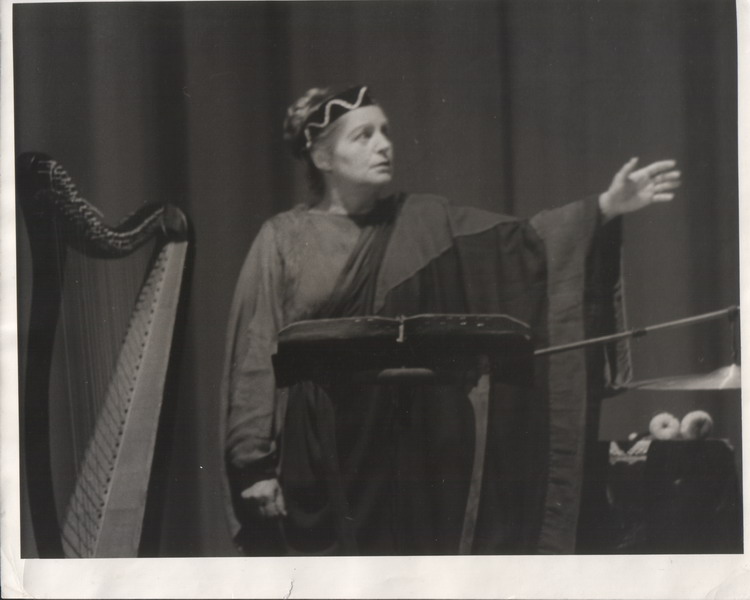 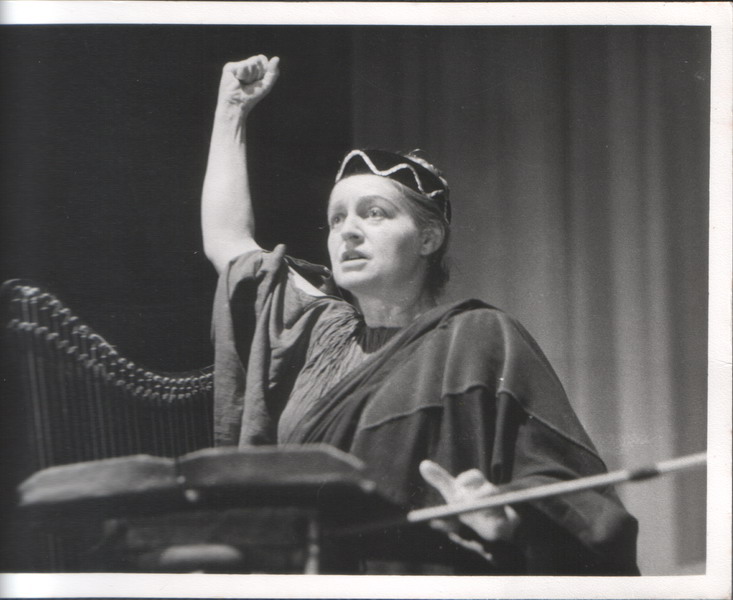
***
|
|